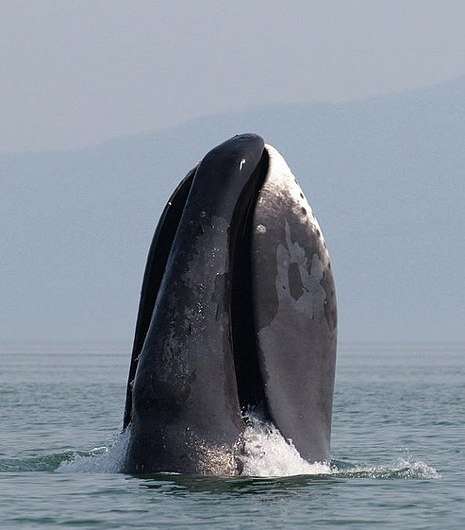A bowhead whale spyhops off the coast of western Sea of Okhotsk. Credit: Olga Shpak/Wikimedia Commons, CC BY-SA
A trio of researchers, one with the University of California-Berkeley, the other two with the University of Buffalo, has found a gene duplication in bowhead whales that may be at least partially responsible for their extremely long lives. Juan Vazquez, Morgan Kraft and Vincent Lynch have published their findings on the bioRxiv preprint server.
Prior research has shown that bowhead whales have long lives—one specimen was found to be 211 years old. Such longevity is extremely rare in mammals because the older an animal gets, the higher the chances that it will develop cancer. Biologists have thus wondered not only how bowhead whales are able to live so long, but how they do so without developing cancers that could kill them.
In their search for an answer, the researchers conducted evolutionary genomics techniques along with experimental biology to learn more about aging processes in the whales. They discovered a gene called CDKN2C that seems to control the cell cycle. It appears to slow down cell division and thus prolong life. As each cell divides, processes take over that monitor cell damage. If damage is found, it is either repaired or the cell commits suicide, thus preventing the regeneration of cell mutations, which prevents tumors from developing. More specifically, they found that the CDKN2C gene handled damage to DNA and duplicated itself over successive generations during its long life.
The researchers also found that the whales' testicles are much smaller than those of other whales of similar size. Together, they weigh on average just 200 kilograms. For comparison, right whale testicles average 1,000 kilograms. The researchers suggest there is likely a connection between the small testicle size and the CDKN2C gene, but they have not found it yet. They conclude that bowhead whales provide an excellent example of a long-lived species that could be studied to learn more about the aging process in general.
More information: Juan M. Vazquez et al, A CDKN2C retroduplication in Bowhead whales is associated with the evolution of extremely long lifespans and alerted cell cycle dynamics, bioRxiv (2022). DOI: 10.1101/2022.09.07.506958
© 2022 Science X Network
























